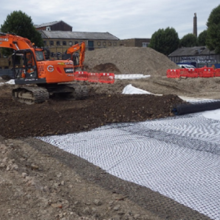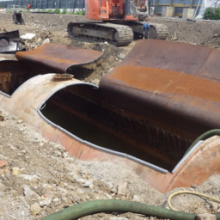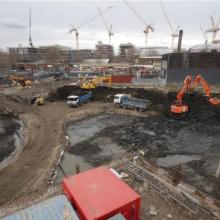Image set

Related services
Opening article section
Article section
Lead
Rich text
Approach
Following appointment by L&Q, Englobe undertook a phased programme of activity to excavate, dispose and recycle excavated materials through its Design and Construct service. The two-phase approach applied an advanced trial pitting exercise to delineate and classify waste materials, including the removal of hardstanding materials - concrete, tarmac and cobbles - and underground obstructions up to a depth of 1m below ground level. Later enabling works included a reduction in the site levels to install a pile mat and manage the disposal of piling arisings. Works also involved bulk excavation of the basement, once secant piles had been installed to form the basement outline.
The two-phase approach with a detailed design stage prior to the main works enabled detailed classification materials to come out of the excavation. This means that the disposal and re-use of materials could be optimised which reduced both programme and cost to the client, demonstrating Englobe’s extensive materials and project management experience.
Content
Carousel
Image set

Image set

Image set

Article section
Rich text
Challenge
The primary challenges for Englobe was to deliver this end-to-end, whole design, project, cost-effectively and with clear sustainability benefits. Hydrocarbon impacted soil, where found, required the efficient treatment, and evidence of perched water needed to be addressed during the project.
Englobe applied its tried-and-tested methodology to treat and transport hydrocarbon impacted soils to a Soil Treatment Facility (STF), to minimise disposal in landfills, while it also used a water treatment system to effectively handle perched water, operated in-line with Thames Water discharge consent and with an Environment Agency Environmental Permit. Throughout the project, Englobe managed site works and provided a non-intrusive and safe service by using a walk-through decontamination unit, operating ambient air monitoring and reducing disturbances to the site’s neighbours through monitoring of noise and vibrations.
Rich text
Risk was managed by:
- Early identification of multiple disposal routes to minimise programme risk.
- Flexible site logistic to maximise the number of lorries that could access the site on a daily basis.
- Use of in-house equipment and plant.
- Ability to effectively sub-contract the building construction.
Statistic carousel
Statistic
Statistic
Statistic
Statistic
Article section
Rich text
No reported health and safety or other incidents during the project lifetime.
Contract Start Date: March 2017
Completed date: April 2018
Contact Value: £3,760,00+
For more information, please see Englobe’s video of the project here.